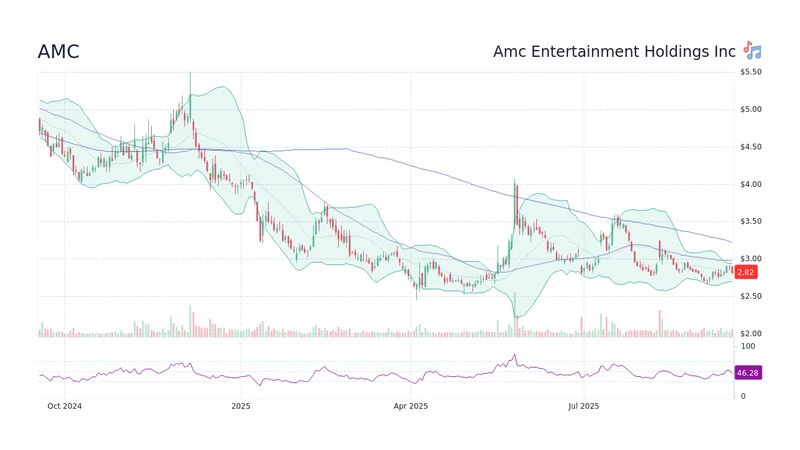Alright, let's dive into this AMC Entertainment (AMC) situation. The stock's hovering near its 52-week low ($2.45, to be precise), and Q3 earnings are about to drop. The narrative? Mixed. Analysts are predicting revenue around $1.23 billion, which is a drop from last year’s $1.35 billion. That's an 11.1% year-over-year decline, directly tied to a slump in the domestic box office.
However, the loss per share is expected to narrow. We're talking about a 20-cent loss versus 33 cents a year ago. The usual suspects – “Superman,” “Jurassic World Rebirth,” and whatever Marvel threw out this quarter – supposedly helped. The thing is, superhero fatigue is real, and those blockbusters might not be the silver bullet AMC needs.
The real head-scratcher is this Netflix partnership. AMC's putting "KPop Demon Hunters" in 300 theaters and hosting a "Stranger Things" finale event on New Year’s Eve. The claim? A mutually beneficial strategy. AMC gets exclusive content, and Netflix gets… theatrical exposure?
I've looked at hundreds of these filings, and this particular strategy is unusual. Netflix already is the distribution channel. Why would they need AMC?

Here's where the data gets interesting. Benzinga Edge gives AMC a Value score of 19.15 and a Momentum score of 12.29. Translation: the stock is cheap, and it's going nowhere fast. These scores paint a clear picture: AMC isn't just underperforming; it's struggling to stay afloat. Is the Netflix partnership a lifeline or a desperate attempt to distract from the underlying issues? How long can they rely on these types of partnerships for revenue?
This Netflix deal feels like rearranging deck chairs on the Titanic. Sure, it might generate some buzz and a temporary bump in ticket sales, but does it address the fundamental problem? People aren't going to the movies like they used to. Streaming services, video games, and a general shift in entertainment habits are all eating into AMC's market share.
AMC's trying to diversify with these partnerships, but are they chasing shiny objects instead of fixing the core business? They're slashing debt (a reported $40 million), which is good, but it's a drop in the bucket compared to their overall financial woes. The CEO is hailing the "strongest box office in 5 years," but that claim needs context. Five years ago, we weren't dealing with the current economic climate or the saturation of streaming options.
And this is the part of the report that I find genuinely puzzling. Is the problem a lack of content, or a lack of demand for the moviegoing experience itself? If it's the latter, no amount of Netflix partnerships will solve it. The movie theater experience has to evolve, and that means more than just bigger screens and comfier seats.
AMC's Q3 earnings are a high-stakes gamble. The Netflix partnership is a bold move, but it might not be enough to offset the company's underlying problems. Investors need to look beyond the hype and focus on the data: declining revenue, low value and momentum scores, and a shifting entertainment landscape. The question isn't whether AMC can survive this quarter, but whether it can adapt to a world where the traditional movie theater is becoming a relic of the past.